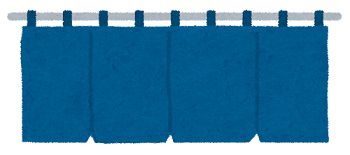Traditional Japanese businesses
Japan is a country with old age customs and a rich culture of businesses and merchants that have been around for a very long time.
There are more than 50,000 businesses that are over 100 years old. Of those, about 4,000 of them have been running for more than 200 years.
As you can imagine, with a history of business stretching back so far, there are some interesting customs that have grown up traditionally in a number of fields of trade.
In this fascinating blog about business practices and language in Japan, Yanaka sensei introduces a phrase that is used in Japanese accounting and bookkeeping that really demonstrates the history well.
Please read the blog without Kanji help, and also with Kanji help to learn some Japanese business language And watch the video, which Yanaka sensei reads herself – to listen to fluent Japanese.
のれん
Japanese noren

By YANAKA Izumi

簿記の勉強をしていたときに「のれん」という項目が出てきました。「のれん」は企業の買収や合併の際に出てくる項目です。例えば、おいしい洋菓子を売っている店があって、私がその店を買おうとします。その店が持っているオーブンや冷蔵庫などの資産の額は全部で10万円です。私は10万円でその店を買うこともできますが、その店の洋菓子は本当においしくて毎日たくさんの人が買いに来ます。菓子職人の腕も確かです。私はインターネットを使ったビジネスをしています。私がその店を買えば、インターネットを使って洋菓子を売ることもでき、もっとたくさんの利益を得ることができます。それで私はその店を15万円で買いました。店を買った額の15万円から店の資産の額10万円を引いた額5万円が「のれん」として計上できます。この5万円は私が洋菓子の味や菓子職人の持つ技術に対して支払った対価ということもできます。
「のれん」には店先にかける布という意味と長年の営業活動から生まれたその店の伝統や信用という意味があります。簿記で出てきた「のれん」はこの二つ目の意味に近いものだと思います。伝統も信用も味も技術もみな形で表すことが難しいですが、立派な店の財産です。こういったものを「のれん」といった人の言葉のセンスが素晴らしいと私は思います。だれが最初にそういったのか。気になるのでもう少し調べてみたいと思います。
To listen to this blog, please watch our Youtube video.
のれん
簿記(ぼき)の勉強(べんきょう)をしていたときに「のれん」という項目(こうもく)が出(で)てきました。「のれん」は企業(きぎょう)の買収(ばいしゅう)や合併(がっぺい)の際(さい)に出(で)てくる項目(こうもく)です。例(たと)えば、おいしい洋菓子(ようがし)を売(う)っている店(みせ)があって、私(わたし)がその店(みせ)を買(か)おうとします。その店(みせ)が持(も)っているオーブンや冷蔵庫(れいぞうこ)などの資産(しさん)の額(がく)は全部(ぜんぶ)で10万円(まんえん)です。私(わたし)は10万円(まんえん)でその店(みせ)を買(か)うこともできますが、その店(みせ)の洋菓子(ようがし)は本当(ほんとう)においしくて毎日(まいにち)たくさんの人(ひと)が買(か)いに来(き)ます。菓子職人(かししょくにん)>の腕(うで)も確(たし)かです。私(わたし)はインターネットを使(つか)ったビジネスをしています。私(わたし)がその店(みせ)を買(か)えば、インターネットを使(つか)って洋菓子(ようがし)を売(う)ることもでき、もっとたくさんの利益(りえき)を得(え)ることができます。それで私(わたし)はその店(みせ)を15万円(まんえん)で買(か)いました。店(みせ)を買(か)った額(がく)の15万円(まんえん)から店(みせ)の資産(しさん)の額(がく)10万円(まんえん)を引(ひ)いた額(がく)5万円(まんえん)が「のれん」として計上(けいじょう)できます。この5万円(まんえん)は私(わたし)が洋菓子(ようがし)の味(あじ)や菓子職人(かししょくにん)の持(も)つ技術(ぎじゅつ)に対(たい)して支払(しはら)った対価(たいか)ということもできます。
「のれん」には店先(みせさき)にかける布(ぬの)という意味(いみ)と長年(ながねん)の営業活動(えいぎょうかつどう)から生(う)まれたその店(みせ)の伝統(でんとう)や信用(しんよう)という意味(いみ)があります。簿記(ぼき)で出(で)てきた「のれん」はこの二(ふた)つ目(め)の意味(いみ)に近(ちか)いものだと思(おも)います。伝統(でんとう)も信用(しんよう)も味(あじ)も技術(ぎじゅつ)もみな形(かたち)で表(あらわ)すことが難(むずか)しいですが、立派(りっぱ)な店(みせ)の財産(ざいさん)です。こういったものを「のれん」といった人(ひと)の言葉(ことば)のセンスが素晴(すば)らしいと私(わたし)は思(おも)います。だれが最初(さいしょ)にそういったのか。気(き)になるのでもう少(すこ)し調(しら)べてみたいと思(おも)います。
Japanese noren
When I was studying bookkeeping, an item called “Noren” came up. “Noren” is an item that appears in the field of company acquisitions and mergers. For example, let's say that there is a shop that sells delicious pastry, and I decide to purchase this shop. And the amount of assets of the shop, for example, the refrigerators and oven, comes to 100 thousand yen. I could purchase that shop for the amount of 100 thousand yen, but this shop's pastries are really delicious and there are many people who come to buy their pastries every day. And the confectioner certainly has great skill. If I run a business on the Internet. And if I buy this shop, I can use the Internet to sell the pastries online and can gain more profits. So, I purchase this shop for 150 thousand yen. If I deduct the cost of the assets (100 thousand yen) from the amount that I purchased the shop for (150 thousand yen), then I can appropriate the left-over amount (50 thousand yen) as an item which we call “Noren” into the records. This 50 thousand can be considered as payment for the taste of the pastries and the skill of the confectioner.
The word “Noren” comes from the piece of decorative cloth that shops hang at their storefronts and it is a custom that comes from many years of business activities and has come to represent that particular shop's traditions and history of trust. And I think that the term “Noren” that appears in bookkeeping holds something close to these two meanings. Tradition, trust, taste, and skill are difficult things to express in a concrete form, but they are legitimate shop assets. I think the person who named this term as “Noren” had a really good sense of language. I wonder who first used this phrase. I would like to know so I think I will look it up a little later.
簿記(ぼき) bookkeeping
項目(こうもく) item
買収(ばいしゅう) acquisitions
合併(がっぺい) mergers
洋菓子(ようがし) cake; pastry
資産(しさん) assets
菓子職人(かししょくにん) confectioner
腕(うで) skill; ability
利益(りえき)を得(え)る gain a profit
計上(けいじょう)する to record; appropriate
対価(たいか) a consideration
店先(みせさき) the store front
布(ぬの) cloth;
長年(ながねん) for many years
営業活動(えいぎょうかつどう) business activities
伝統(でんとう) tradition
信用(しんよう) credit
立派(りっぱ)な proper
財産(ざいさん) property;
のれん (1) a shop curtain (2)credit; reputation (3)goodwill
Hajimemashite ! My name is Izumi YANAKA.
Through my work as a System Engineer, I have had the experience of teaming up with foreign members of a team. After seeing the difficulties the team members went through with communication and cultural differences, I got to thinking, "If only there was something I could do to help !" Which was what led me to become a Japanese teacher.
How do you find studying Japanese ? Is it difficult ? Do you find it trying ? At the beginning, easy phrases will do, just think of what you want to say and give it a go. For example, let's talk about your favorite things. I like playing tennis, traveling, and gardening. What do you like to do ?
What's the best phrase to say in this situation ? Is this grammar usage correct ?
If you have questions like these on your mind, I want to answer them all one by one. And in this way, without even realizing it, your Japanese will come to improve.
Once you are able to speak, it gets to be fun. It's not difficult, and not trying at all ! I will help you widen your Japanese speaking world. Let's enjoy learning Japanese together.



